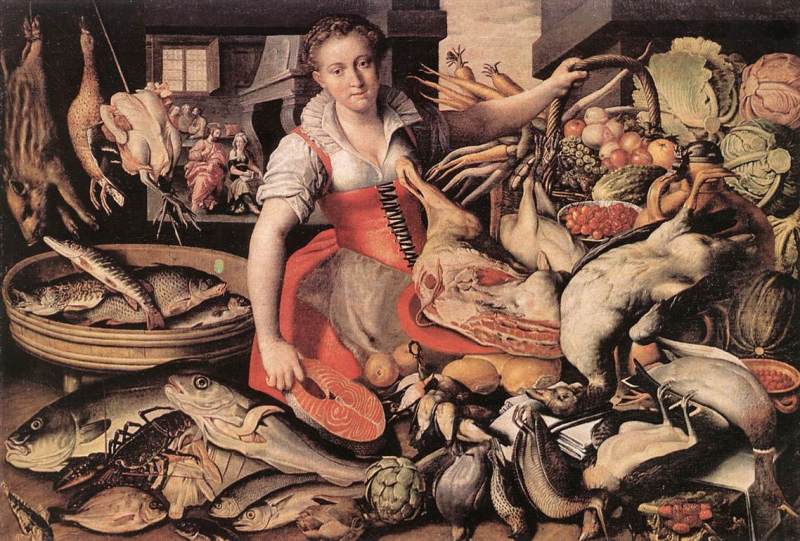This is the second year I’ve taken part in a thing called Lent Madness. Two wonderful Episcopal priests came up with a bracket of saints each Lent for living saints to read about and vote on. The winner takes The Golden Halo. Today pits Martha of Bethany against Harriet Tubman. I thought it would be a good day to repost this article on Martha showing how important homemakers were to the Early Church. After you read it, head over to Lent Madness and vote for Martha!
July 29 is the feast day of the sisters Martha and Mary. I’ve written on both sisters before here, here, here, and here. But the one thing I’ve never written on concerning the sisters is that Martha’s skills in the home were instrumental in the establishment of the church and giving the church a foothold in wider Greco-Roman society. Martha usually takes a lot of slack for her homemaking skills due to Luke 10:38-42:
Now as they went on their way, he entered a certain village, where a woman named Martha welcomed him into her home. She had a sister named Mary, who sat at the Lord’s feet and listened to what he was saying. But Martha was distracted by her many tasks; so she came to him and asked, “Lord, do you not care that my sister has left me to do all the work by myself? Tell her then to help me.” But the Lord answered her, “Martha, Martha, you are worried and distracted by many things; there is need of only one thing. Mary has chosen the better part, which will not be taken away from her” (NRSV).
This is an important passage for women being disciples along with men, and Jesus treating his male and female disciples equally. But I’ve done lots of writing on that subject. It’s time to look at the busy homemakers of the The New Testament, the Marthas. The New Testament lists several women who hosted churches in their home:
- Mary, the mother of John Mark (Acts 12:12-17)
- Lydia (Acts 16:11-15)
- Priscilla (Romans 16:3, 1 Corinthians 16:19, 2 Timothy 4:19)
- Chloe (1 Corinthians 1:11)
- Nympha (Colossians 4:15)
- The Elect Lady of 2 John
In order for there to be enough room for the church to meet, the homes they met in were probably the homes of the richer members of the church. We see this with Lydia: she was a merchant, and had her own household with slaves. She was a rich businesswoman. In Luke 10 Martha is preparing a meal for Jesus and his 12 disciples. In order to accommodate this many people Martha, Mary, and Lazarus had to be rich. Martha was used to running a large house.
Guardian, Military Commander, Queen
In the Greek philosopher, Socrates’ book Oeconomicus (Economics), we see the kind of power the matrona, matron of the house had. Socrates said these were the matron’s responsibilities:
Supervision of all comings and goings in the house, protection and distribution of supplies, supervision of weaving and food production, care of sick slaves, instruction slaves in household skills, rewarding and punishing slaves, in short independent management of an entire household (7.36-43). She is to be the guardian of its laws, like a military commander, a city councilor, or a queen… (A Woman’s Place*, 146).
The matron was not only responsible for everything that went on in her home and estate, she was also to set an example by working with her servants and slaves. Matrons spun wool and flax, wove, and prepared food. In Greek and Roman literature writers and poets pictured the ideal Roman matron as one who wove cloth and clothed her family with her own hands.
According to the literature of the time (reading between the male centric lines) the matron of the household operated independently of her husband, and the husband liked it that way. The matron was the queen of her domain.
“It is surprising how much responsibility is expected of wives: total management of household resources, personnel, and production–quite a different picture from the passive image of the wife in the New Testament household codes. This literature gives us insight into how wives and hence widows were perfectly used to being independent household managers and how men expected them be just that” (p. 152).
The household was a woman’s place. So what does that mean for the early church that met in these women’s spaces where women were expected to be the leaders and managers?
This is my body…
It means the members of the churches that met during the time of the New Testament would not have thought twice about women being leaders in their services. It would also not be unusual for a woman to preside over the love feast and communion during this time:
The host of the meal would have been the ordinary leader of any toasts that took place and, in Christian groups, of the special blessing and sharing of bread and cup with ritual words toward the end of the eating portion of the meal (p. 159).
As meals fell under the domain of the woman in the house, it would not be unusual for the matron of the house to preside over the meal. There are also women like Mary, Nympha, Lydia, and Chloe who are not linked with husbands, which meant they hosted the love feasts in their homes and presided over communion. A typical Roman meal also included discussions on philosophy, along with teaching. Most of the teaching and preaching that happened in the early church probably happened around the table while everyone was eating, and the matron of the household presided over it all making sure everything ran smoothly.
What does all of this have to do with Martha?
Martha started it. Martha hosted the first church in her home. She provided shelter and food for Jesus and his disciples. Jesus taught in her home. Jesus ate in her home. Martha was the first hostess of the church.
There is one more thing about Martha that gets overlooked that we should look at. In John we meet Martha in chapter 11, and she is not happy. She had sent a message to Jesus that her brother Lazarus was sick, and asked him to come and heal him. Jesus waited until Lazarus was dead before he set off for Bethany where Martha lived. Martha met Jesus on the road and accused him of letting Lazarus die. But in her anger and grief, she still believed that Godde would do what Jesus asked. When Jesus asked her if she believed that Jesus was the resurrection and life her answer was:
Lord, I believe that you are the Messiah, the Son of God, the one coming into the world. –John 11:27
In John Martha made the confession that Jesus was the Messiah, the Son of Godde, not Peter. In John Martha’s confession is the rock the church is built on. So my question is this: Pope Martha anyone? In John Godde revealed to Martha what flesh and blood had not, and she is indeed blessed for proclaiming the faith that is the rock on which the church is built. Not only did Martha make that confession of faith, but her home became a meeting place for the early church. Not all apostles and “popes” traveled to tell about Jesus, some of them stayed put and offered the hospitality and protection of their homes for the beginning Christian movement.
The early church depended on homemakers, like Martha, to provide an organized, well-run home for them to meet in. It was the woman who made sure the meal was ready and presided over the meal and all that happened during the meal. Jesus may have discounted Martha’s worries over the meal. May be Martha did allow herself to be distracted by too many things. But the early church gives a different testimony about Martha, her duties, and her worries. Without women like Martha efficiently running large, rich households there would be no church.
*”Women Leaders of Households and Christian Assemblies” in A Woman’s Place: House Churches in Earliest Christianity by Carolyn Osiek and Margaret Y. MacDonald with Janet H. Tulloch (Minneapolis: Fortress Press, 2006), 144-163.
For more on the women in John, and their influence and leadership in the Early Church, see Did Early Christians Agree on Women Leaders?
 Would you like to learn even more about the women in the Bible? Buy my new book What You Didn’t Learn in Sunday School: Women who Didn’t Shut Up & Sit Down (Amazon, Wifp & Stock) and meet women like Martha who were business women, leaders, and prophets. You might be amazed when you find out what you didn’t learn in Sunday School.
Would you like to learn even more about the women in the Bible? Buy my new book What You Didn’t Learn in Sunday School: Women who Didn’t Shut Up & Sit Down (Amazon, Wifp & Stock) and meet women like Martha who were business women, leaders, and prophets. You might be amazed when you find out what you didn’t learn in Sunday School.

Pingback: Did the Early Christians Agree on Women Leaders? | Shawna R. B. Atteberry
As an Altar Guild directress, I feel a kinship with Martha. If she isn’t the patron saint of Altar Guilds, she should be. We are sometimes good-naturedly mocked for our attention to the details if setting up for services, but it is an integral part of worship for me.